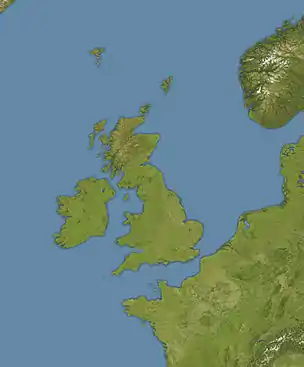SS Lambridge
SS Lambridge was a 5,119 GRT UK cargo ship that was built in 1917, gave 28 years of service and was scuttled in 1945.[3][2] She was launched as Glennevis but changed owners and names a number of times, successively becoming African Prince, Pentridge Hill, Botlea, HMS Lambridge and Lambridge. She was scuttled as part of a programme to dispose of UK stocks of chemical weapons.
| History | |
|---|---|
| Name: | Glennevis[1] |
| Namesake: | Glen Nevis, Scotland |
| Owner: | Western Steam Ship Co, Glasgow[2] |
| Operator: | James Gardiner & Co[2] |
| Port of registry: |
|
| Builder: | Ayrshire Dockyard Company Ltd, Irvine[1] |
| Yard number: | 445[3][2] |
| Launched: | 1917[3][2] |
| Completed: | May 1917[1] |
| Out of service: | 1922[2] |
| Fate: | Sold |
| Name: | African Prince[1] |
| Owner: | Rio Cape Line, Ltd.[1] |
| Operator: | Furness Withy[1] |
| Port of registry: |
|
| Acquired: | 1922[2] |
| Out of service: | 1936[2] |
| Identification: |
|
| Fate: | Sold[2] |
| Name: | Pentridge Hill[4] |
| Namesake: | Pentridge Hill, Dorset |
| Owner: | Dorset Steam Ship Company[4] |
| Operator: | Counties Ship Management[4] |
| Port of registry: |
|
| Acquired: | 1936[4] |
| Out of service: | 1939[5] |
| Identification: | |
| Fate: | Sold |
| Name: | Botlea[5] |
| Owner: | Ministry of War Transport (1939)[5] |
| Operator: |
|
| Port of registry: |
|
| Acquired: | 1939[5] |
| Out of service: | 1939[2] |
| Identification: | |
| Name: | HMS Lambridge (X15)[3][2] |
| Owner: | Admiralty[3] |
| Operator: |
|
| Acquired: | 1939[2] |
| In service: | 1939 |
| Out of service: | 1941[2] |
| Name: | Lambridge[3][2] |
| Owner: | Admiralty[3] |
| Port of registry: |
|
| In service: | 1941 |
| Out of service: | 1945[2] |
| Fate: | Scuttled[3][2] |
| General characteristics | |
| Type: | cargo ship[1] |
| Tonnage: | |
| Length: | 400.7 feet (122.1 m)[1] p/p |
| Beam: | 53.4 feet (16.3 m)[1] |
| Draught: | 24 feet 1 inch (7.34 m)[1] |
| Depth: | 27.4 feet (8.4 m)[1] |
| Installed power: | 510 NHP[1] |
| Propulsion: | 3-cylinder triple expansion steam engine; single screw[1] |
| Speed: | 10.5 knots (19.4 km/h)[2] |
Building
The Ayrshire Dockyard Company Ltd. built the ship to the UK Shipping Controller's standard "B" type cargo ship design. She had nine corrugated furnaces with a combined grate area of 119 square feet (11 m2) heating three 180 lbf/in2 single-ended boilers with a combined heating surface of 7,647 square feet (710 m2).[1] The boilers fed a Dunsmuir and Jackson three-cylinder 510 NHP triple expansion steam engine that drove a single screw propeller.[1]
Names and owners
The ship was launched in 1917 as Glennevis for the Western Steam Ship Company of Glasgow.[2] In 1922 she was sold to Furness Withy who renamed her African Prince.[2] In 1936 she was sold to the Dorset Steamship Company, which renamed her Pentridge Hill.[4] Dorset SS Co was a London-based company controlled by Counties Ship Management.[4]
In 1939 she was sold to Sir Wm. Reardon Smith & Sons, Ltd, who renamed her Botlea.[5] In September and October 1939 she became one of nine merchant ships that the Admiralty acquired to convert into Q-ships.[2] Botlea was commissioned into the Royal Navy as HMS Lambridge with the pennant number X15. The Q-ships were not successful and from February 1941 she served as the armed merchant cruiser Lambridge.[3]
Scuttling
After the Second World War the Admiralty used her to dispose of redundant chemical ammunition.[2] On 30 December 1945 she was scuttled in the North Atlantic beyond the continental shelf, 120 miles (190 km) northwest of Ireland.[7] Her wreck is at 55°30′N 11°00′W in 8,200 feet (2,500 m) of water.[7]
Lambridge was one of four redundant cargo ships that the Admiralty used to dispose of chemical ammunition at the same site in the North Atlantic.[2] The others were Empire Simba on 11 September, Empire Cormorant on 1 October and Wairuna on 30 October.[2]

References
- Lloyd's Register of Shipping (PDF). London: Lloyd's Register. 1930. Retrieved 30 March 2013.
- Lettens, Jan; Allen, Tony (27 December 2010). "Pentridge Hill SS (1936~1939) Lambridge SS [+1945]". The Wreck Site. Retrieved 17 June 2011.
- Cameron, Stuart; Strathdee, Paul; Robinson, George. "Glennevis (1917)". Clydebuilt Database. Archived from the original on 28 July 2012. Retrieved 17 June 2011.CS1 maint: unfit URL (link)
- Lloyd's Register of Shipping (PDF). London: Lloyd's Register. 1937. Retrieved 30 March 2013.
- Lloyd's Register of Shipping (PDF). London: Lloyd's Register. 1940. Retrieved 30 March 2013.
- Lloyd's Register of Shipping (PDF). London: Lloyd's Register. 1945. Retrieved 30 March 2013.
- Bowles, R. British Isles Explosive Dumping Grounds. London: Ministry of Defence. p. 2.